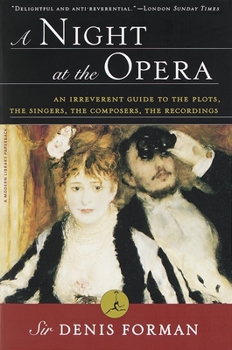A Night at the Opera: An Irreverent Guide to the Plots, the Singers, the Composers, the Recordings
Select Format
Select Condition 
Book Overview
"Delightful and anti-reverential"-- Sunday Times (London) With an encyclopedic knowledge of opera and a delightful dash of irreverence, Sir Denis Forman throws open the world of opera--its structure,... This description may be from another edition of this product.
Format:Paperback
Language:English
ISBN:0375751769
ISBN13:9780375751769
Release Date:September 1998
Publisher:Modern Library
Length:976 Pages
Weight:2.50 lbs.
Dimensions:2.4" x 6.1" x 9.2"
Customer Reviews
4 ratings
Nutty, profound, and extremely enjoyable
Published by Thriftbooks.com User , 21 years ago
Suppose you had an eccentric, British uncle who was absolutely nuts about opera. You're a tyro yourself, so whenever you go CD shopping or attend a live performance, he entertains you with a humorous summary of the libretto (not too hard to do with an opera if it's not "Wozzeck"), tells you which bits to really listen for, and provides a critique of singers. He's an expert---after all he was the deputy chairman of one of England's great opera houses---but he's not a snob. Listen to what he has to say about death in the mystic land of Oprania:"Death is extremely common and has an almost universal characteristic unknown in our world, namely a period of Imminence during which the doomed person suffers a compulsion to sing. There are few known cases in Oprania where death has occurred without an aria, or at least a cavatina, being delivered during Imminence. The period of Imminence for long deaths can last for up to a whole act. Not even decapitation can ensure an aria-free death..."If you think bursting into song at death's door is highly unlikely, listen to what the author--I mean your uncle--has to say about Valentin's death (he was stabbed by Faust with the help of the devil) in Gounod's "Faust:""Valentin is found dying in the street by a respectful and horrified chorus. He makes the customary brave gestures of a soldier in the face of death and turns on Marguerite [his sister who is Faust's lover] rather nastily (first in recitative and then in a short aria) saying that the only course open to her now is to become a hooker for the rest of her life."Valentin curses his sister and dies, and for all his musical effort is only awarded one star (out of a possible three) by Sir Denis. "Faust" itself is rated a 'beta' (on a scale where 'alpha-plus' is reserved for truly great operas such as "The Marriage of Figaro", and 'gamma or less' for truly forgettable operas such as "La Rondine"). I almost subtracted a star from my review because Sir Denis awarded 'betas' to two of my favorite operas (Handel's 'Caesar' and Verdi's 'Forza'), but "A Night at the Opera" is way too good and funny and idiosyncratic (in the grand style that only British authors seem to be able to carry off) to be anything but a five-star book.The eighty-three operas that were chosen to appear in this book all had three or more versions listed in the "Gramophone" CD catalogue of December 1992, from Cilea's "Adriana Lecouvreur" to Berg's "Wozzeck." Each opera's libretto is lovingly (and somewhat whackily) described. There is a "Look Out For" section that describes and rates the opera's arias, preludes, choruses, intermezzos, etc. with one to three stars. Example: "Si adempia il voler" from Puccini's "Tosca":"The final scene [of Act II]: Scarpia sits down to write the phoney letter of safe conduct to a sweeping melody,** calm but full of menace, giving us a breathing space between the storms past and the storm to come: then the 'kiss of Tosca' [she stabs Scarpia] with all th
Great, though irreverant, guide to opera
Published by Thriftbooks.com User , 23 years ago
Much more than just a collection of synopses of the great operas, A Night at the Opera provides a great starting point for learning about any major opera.First, you'll learn about how the opera came to be written and the story behind the story. Then, there's a full synopsis of the opera. Next is a musical description of the numbers, with a system of noting the highlights to watch out for. Finally, there's an essay by the author, Covent Garden's Denis Foreman and his rating.There's about five pages or so per opera, with longer ones getting much more (there's a whole introduction to The Ring). The style is breezy and colloquial. Foreman writes in a very tongue in cheek way that obviously some people don't get or like. Still, unless you despise dry English humor, it's a lot of fun. The synopses can get a little hard to follow with some of Foreman's jokes at times, however.Also, there's a large glossary in back with lengthy dissertations (again, very tongue in cheek), and composer/singer/conductor bios. All in all a great resource, even if you already have a book of opera synopsis.
A Must-Have
Published by Thriftbooks.com User , 25 years ago
This book is terrific. Read it before you listen to or watch an opera--and read it after--and if home, read it during. He's very funny, but in a way that enhances, not diminishes, the pieces themselves. His analyses of the works are very detailed, including a rating, like Michelin, of the highlights. I'm giving it as a gift to my sister, now.
This book was my favorite birthday present!
Published by Thriftbooks.com User , 26 years ago
This book is a treat. This guy knows opera, knows how to write, and has a great sense of humor. Forman's treatments of each opera are extensive and very informative, but never dull. Far from it -- who would ever think you could laugh yourself off your chair with a serious opera book?! But this one does it. I love the way he begins each synopsis with, "The One Where . . . ." If everyone read this book, opera would lose its reputation as a stuffy art form.




